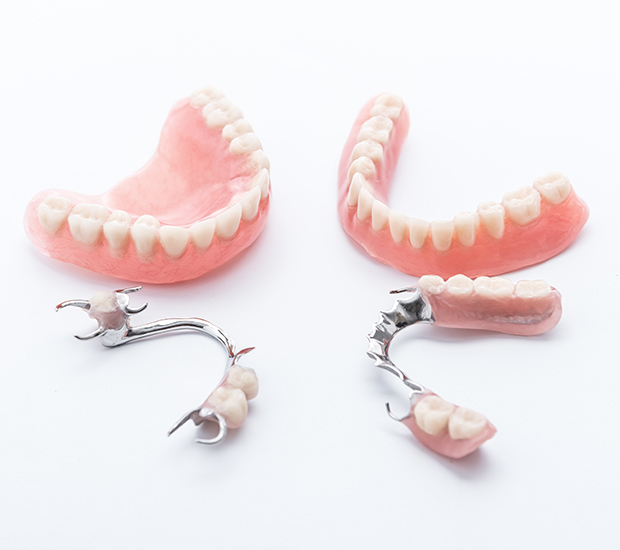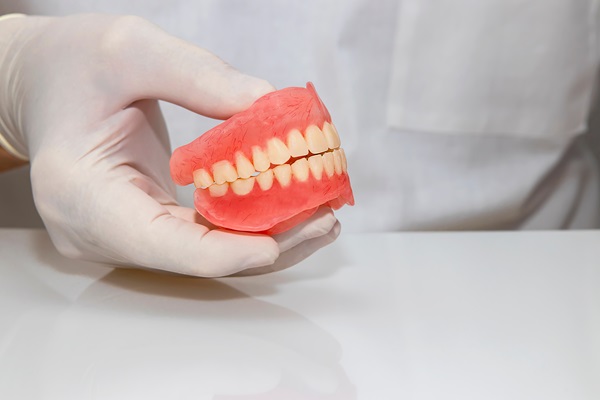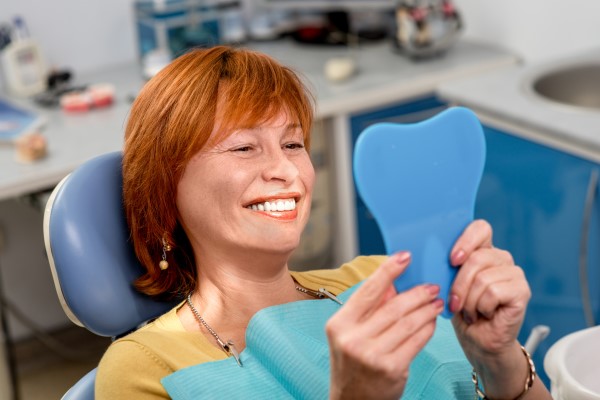Dentures and Partial Dentures Torrance, CA
When it comes to lost teeth, there are many practical replacement options to restore one's smile. Missing teeth are not just a question of appearance; they also affect the health of the remaining teeth as well as everyday comfort. Dentures and partial dentures are popular tooth replacement options that are customized for an optimal fit.
Dentures and partial dentures are available at SmileWell Family Dentistry in Torrance and the surrounding area. We use high-quality materials and advanced fitting techniques to support your comfort and dental health. With our help, you can select the type of denture that will work for you.
Get in touch today by calling us at 310-904-6375 to discuss how dentures can improve your quality of life.
Benefits of Getting Dentures
It is normal for people to be nervous about getting dentures and partial dentures. Replacing teeth is an essential step in a person's journey to achieve the oral health they want. Dentures are natural-looking. When in place, dentures do not look awkward or clunky. Dentures have strong artificial teeth and allow patients to eat many of their favorite foods. Also, this treatment can last for ten years or more, depending on how well the patient will take care of the dentures.
According to WebMD, wearing dentures can improve a person's smile. No longer does the patient have to hide a toothless smile but can instead open up without feeling embarrassed or ashamed. Showing off one's smile can make it more comfortable to meet new people, speak in public, socialize, and get back activities they once did. Dentures will typically not cost as much as some other treatments. Some insurance plans may even cover some of the costs. If your considering dentures, talk with your insurance provider to see what parts of the cost are covered.
Check out what others are saying about our denture and partial denture services on Yelp: Dentures and Partial Dentures Torrance
Choosing Dentures for Tooth Replacement
Dentures and partial dentures only represent one of the many options patients can choose from.
When to Get Dentures
Dentures become a viable option almost every time someone loses their teeth. Even the loss of one tooth can result in the use of partial dentures to rectify the problem. If a person decides to get implants or bridges, they may still wear dentures temporarily until this work is completed.
Note that young people lose their teeth too. One of the most common reasons for this is facial trauma, such as a sporting injury, motor vehicle accident, or a bad fall. These instances can lead to not just missing teeth, but also cracking and breaking.
In addition to this, young people may struggle with cavities. In fact, tooth decay affects people of all ages, especially those who love sugary foods and fizzy drinks. People with poor dental hygiene may also suffer more from caries than others.
Another effect of poor dental hygiene is gum disease, which is sometimes known as periodontal disease. This infection of the gums and the material surrounding the teeth may lead to complete tooth loss over time. People who smoke are more likely to suffer from gum disease than others.
Finally, there are several other health conditions and medications that may result in tooth loss. Diabetes, ectodermal dysplasia, rheumatoid arthritis, and gastrointestinal reflux may all increase the likelihood of tooth loss over time.
How Dentures Are Made
Some processes may differ depending on the materials used in making dentures, but it typically advances in the following sequence.
The process starts with taking an impression of the mouth. The dentist then creates a model using dental stone as a cast. The doctor may then ask the patient to try several different sets of sterilized dentures to determine the ideal fit as well as the preferred color and size of the teeth. After these selections, the dentist may then make some adjustments to the cast. Thereafter, it is sent to a dental laboratory for completion.
At the dental lab, technicians may then create a wax version of the gum line. These technicians make the replacement teeth from a material that closely resembles real teeth known as resin. Virtually all labs then seek approval from the patient and dentist before proceeding with the finishing touches.
Following approval, the technician removes the wax and replaces it with acrylic, which looks far more realistic. This process entails boiling to get rid of the wax, drilling holes in the teeth, and then injecting the acrylic. Finally, technicians clean up the teeth and polish the appliance. The entire process may require the patient to visit the dentist’s office four to five times.
Types of Dentures
When patient’s lookup types of dentures, they mostly come across full dentures and partial dentures. However, these are just the tip of the iceberg. Over the past few years, dentists created hybrids with other dental treatments to provide patients with even more options. You may contact one of our SmileWell Family Dentistry team members to find out which denture is right for you.
1. Full Dentures
Most commonly used by seniors, these dentures replace a complete set of teeth. They sit directly on top of the gums. Some patients are good candidates for immediate placement. In this instance, the dentist places the previously made dentures immediately after the extraction of the teeth. For everyone else, the dentist may recommend waiting eight to 12 weeks after teeth removal.
2. Partial Dentures
When a patient still has teeth to blend in and anchor with the newly created teeth, the dentist may recommend partial dentures. This may require the use of a metal piece to which a pink-colored base is attached. The metal helps to anchor the false teeth to the natural teeth to prevent movement.
When a patient still has teeth to blend in and anchor with the newly created teeth, the dentist may recommend partial dentures. This may require the use of a metal piece to which a pink-colored base is attached. The metal helps to anchor the false teeth to the natural teeth to prevent movement.
3. Implant-Supported Dentures
This method blends dental implants with dentures. Instead of anchoring all the teeth in place individually, the dentist may add several dental implants that hold the full upper and/or lower set in place. Dentists may use this for partial dentures too. These dentures are not removable once in place. Please note that not all patients are good candidates for dental implants.
4. Overdentures or Snap-In Dentures
When patients prefer to retain the ability to remove dentures, but like the stability of implants, they may opt for overdentures. These are handy in instances where a person has no teeth, as the dental implants provide an anchor that the teeth can sit on. For even more excellent stability, patients may opt for snap-in dentures. In this case, the implants have locator receptors, and the dentures have attachments. These work together to snap the dentures into place for a snug fit.
Options Other Than Dentures and Partial Dentures
Dentures have been improved in design for over a hundred years. Today they are a viable option for patients of all ages, whether one tooth needs to be replaced or many. At SmileWell Family Dentistry, we can advise patients on when this treatment would suit their oral health needs. At our office, we can also advise you on other options for replacing missing teeth. Each type of tooth replacement has distinguishing qualities. There are two primary categories of tooth replacement other than dentures:
- Dental implants. These are artificial teeth similar in look and feel to natural teeth. They have roots made with screws that are inserted into the jaw for stability. Implants are highly durable with the capacity to last a lifetime with proper care.
- Dental bridge. A bridge closes the space left by missing teeth; hence, why they are referred to as “bridges.” Bridges are held in place by either natural teeth or implants with artificial teeth bridging the space and two or more crowns placed over the teeth and connected to an artificial tooth.
How to Care for Dentures
A set of dentures represents a significant investment and is vital for your health and comfort. Taking good care of them can help them last longer. Proper maintenance is also essential to avoid problems with oral health that may otherwise arise.
Patients who have removable dentures must be careful to avoid dropping them when they are out. Otherwise, they can become chipped or cracked. Make it a habit to handle them over a folded towel or other soft material in case they slip out of your hand.
Dentures are designed for the moist environment of the mouth. Exposing them to dry air can warp their shape. When taking out dentures for a period of time, such as overnight, store them in water or an appropriate denture cleansing solution. However, do not use hot water as that can also affect the dentures' shape.
Make sure to clean the dentures daily. Just as with natural teeth, the build-up of food debris and plaque can encourage bacterial growth and compromise your oral hygiene. You also do not want permanent food stains on your new teeth.
Rinse out dentures with water after every time you eat to remove bits of food. In addition, brush the set once a day using a soft brush specially designed for dentures. Clean all surfaces of the dentures gently, taking special care with the bend attachments.
Do not use regular toothpaste to clean dentures, as it is too abrasive. Use a special denture cleaning solution such as these tablets from Efferdent®, Polident®, and Secure®. You may also use a mild dishwashing liquid but no other types of household cleaners. However, before choosing a cleaner on your dentures, consult a dentist.
Some people like to use ultrasonic cleaners for dentures. These devices typically consist of a container with a water solution inside. When the dentures are put inside, the cleaner uses sound waves to clean them gently. The dentures still need to be brushed thoroughly on a daily basis in addition to the ultrasonic cleaner.
Common Misunderstandings About Dentures
There are many benefits and advantages to getting dentures. However, some prospective patients shy away from seeking this treatment because of myths and other false information. Some people do not know enough about dentures and how this treatment can benefit their oral health and the appearance of their face.
People often believe that dentures are the last resort when all other options have failed. The fact is that dentures are not nearly as invasive as other treatment options. Wearing dentures can preserve mouth function as well as any other option.
Another misconception is that it is easy to spot a pair of dentures in a person’s mouth. Dentures are natural-looking in the base with artificial teeth. We can help ensure that dentures or partial dentures blend in with the surrounding teeth. Also, while dentures can fall out at inopportune times, our dentist can suggest adhesive products to hold the appliance in place.
Questions Answered on This Page
Q. Are there different types of dentures?
Q. Are there dentures to replace a few of my teeth?
Q. What are the benefits of dentures?
People Also Ask
Q. How do I take care of my dentures?
Q. What do I do if I damage my dentures?
Q. What do I need to know about making adjustments to my dentures?
Definition of Denture Terminology
- Alveolar Bone
- The alveolar bone is the bone surrounding the root of the tooth that keeps the tooth in place.
- Clasp
- A clasp is a device that holds a removable partial denture prosthesis to the teeth.
- Denture Base
- The denture base is the part of the denture that connects the artificial teeth with the soft tissue of the gums.
- Edentulous
- Edentulous is a term that applies to people who do not have any teeth.
- Periodontal Disease
- Periodontal disease is a condition that causes inflammation of the gingival tissues and membrane of the teeth, leading to tooth loss without professional treatment.
- Pontic
- Pontic is another term for an artificial tooth on a fixed partial denture.
- Rebase
- Rebase is the process of refitting denture prosthesis by replacing the base material.
- Reline
- Reline is when a professional resurfaces the surface of the prosthesis with a new base material.
- Resin/Acrylic
- Resin and Acrylic are resinous materials that can be components in a denture base.
- Stomatitis
- Stomatitis is the inflammation of the tissue that is underlying a denture that does not fit properly. It can also result from other oral health factors.
Back to top of Artificial Teeth




